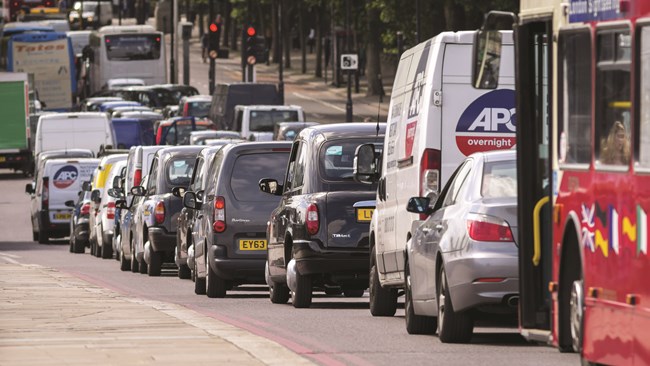We use cookies to ensure that we give you the best experience on our website. If you continue without changing your settings, we will assume that you are happy to receive all cookies on the Business Car website. However, if you would like to, you can change your cookies at any time

The start point for the best source of fleet information |
Daily driving charge among London emissions proposals
Date: 19 January 2022 | Author: Sean Keywood

A new daily charge could be introduced for most vehicles to drive in Greater London under proposals being considered by the city's mayor.
Sadiq Khan is looking at the scheme, which would involve a 'low-level' charge for 'all but the cleanest vehicles', as a number of potential options in response to a new report on achieving net-zero emissions by 2030.
The report, commissioned by the mayor from Element Energy, states that car traffic in the city must be reduced by at least 27% by the end of the decade, and that to achieve this a new kind of road charging scheme will need to be introduced, which could replace existing charges such as the Congestion Charge and Ultra Low Emission Zone (ULEZ).
Ahead of this potential scheme, however, the mayor is considering the daily charge scheme as an interim option, alongside other possible approaches such as expanding the ULEZ, and introducing a Greater London boundary charge which would apply to non-London registered vehicles entering the capital.
The mayor and Transport for London will now conduct a consultation period about the proposals, with the aim of implementing the chosen scheme by May 2024.
The mayor said: "This new report must act as a stark wake-up call for the Government on the need to provide much greater support to reduce carbon emissions in London. It's clear the scale of the challenge means we can't do everything alone.
"But I'm not willing to stand by and wait when there's more we can do in London that could make a big difference. We simply don't have time to waste.
"The climate emergency means we only have a small window of opportunity left to reduce carbon emissions to help save the planet, and, despite the world-leading progress we have made over the last few years, there is still far too much toxic air pollution permanently damaging the lungs of young Londoners."
Reacting to the announcement, BVRLA chief executive Gerry Keaney said: "We welcome the Mayor of London taking the initiative with these plans, which complement the BVRLA's ongoing support for shared mobility models and a clear roadmap for road pricing.
"Importantly, this announcement gives the industry time to implement the changes that are essential to making the targets reality.
"London does not only have an emissions problem, it has a congestion problem too. We need fewer, cleaner private cars on the road. Car clubs, alongside rental and leased vehicles provide the solution to this while keep people mobile and offering positive alternatives to public transport."
Keaney said BVRLA members were already providing answers to the problems faced by London and other cities with the likes of electric car clubs and zero-emission delivery vehicles.
He added: "Our members will play an essential role in the success of these plans and will have invaluable insights that will help the mayor deliver; we need to be at the table and ensure our voices are heard."
Giving a more critical reaction, RAC head of roads policy Nicholas Lyes said: "These proposals would create massive financial challenges for individuals, families and businesses who run a car in London and even for those who visit the fringes of the capital.
"We all want to see cleaner air and cleaner vehicles on the road and it's right the mayor has ambitions to reduce emissions from road transport but these proposals could be beyond the means of many and will punish those who simply cannot afford an electric car. Our research suggests fewer than a third of drivers in London expect to switch to an electric vehicle within the next five years, and at the same time the mayor himself cannot commit to a zero-emission TfL bus fleet until 2037.
"Worse still, proposals to charge vehicles outside of London to enter the boundary is likely to impact hardest on workers such as carers, tradespeople and night-time economy staff for whom there is no alternative to using a vehicle.
"At a time when the basic cost of living for Londoners is soaring, these proposals seem to be poorly timed, so we strongly urge the mayor to think again instead of defaulting to extracting more money from the pockets of London's drivers."
The report highlights how, between 2000 and 2018, London saw a 57% reduction in workplace greenhouse gas emissions, and a 40% reduction in home emissions, but just a 7% reduction in transport emissions.
It says that more than a third of car trips in London could be walked in less than 25 minutes, and that two-thirds could be cycled in less than 20 minutes.
While the current ULEZ and the London Low Emission Zone are expected to lead to a 5% fall in CO2 emissions and a 40% fall in nitrogen oxide emissions, it says they are not nearly enough to meet future targets.











